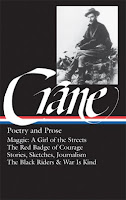From Stephen Crane: Prose & Poetry
Interesting Links
Video: “Burning Boy: Paul Auster on the Extraordinary Life and Work of Stephen Crane” (LOA LIVE, Library of America)
“The Miracle of Stephen Crane” (Adam Gopnik, The New Yorker)
Previous Story of the Week selection
• “The Price of the Harness,” Stephen Crane
• “Chickamauga,” Ambrose Bierce
• “A Woman’s Recollections of Antietam,” Mary Bedinger Mitchell
• “The Armies of the Wilderness,” Herman Melville
Buy the book
 Stephen Crane: Prose & Poetry
Stephen Crane: Prose & Poetry
The Red Badge of Courage | Maggie | George’s Mother | The Third Violet | “The Monster” | stories, journalism, poetry, and more | 1,379 pages
List price: $50.00
Web store price: $35.00
Video: “Burning Boy: Paul Auster on the Extraordinary Life and Work of Stephen Crane” (LOA LIVE, Library of America)
“The Miracle of Stephen Crane” (Adam Gopnik, The New Yorker)
Previous Story of the Week selection
• “The Price of the Harness,” Stephen Crane
• “Chickamauga,” Ambrose Bierce
• “A Woman’s Recollections of Antietam,” Mary Bedinger Mitchell
• “The Armies of the Wilderness,” Herman Melville
Buy the book
 Stephen Crane: Prose & Poetry
Stephen Crane: Prose & PoetryThe Red Badge of Courage | Maggie | George’s Mother | The Third Violet | “The Monster” | stories, journalism, poetry, and more | 1,379 pages
List price: $50.00
Web store price: $35.00
 |
| Civil War study “no. 77” (a wounded Union soldier), c. 1886, oil on linen attributed to German American painter Friedrich Wilhelm Heine (1845–1921). According to the Wisconsin Historical Society (the source of this image), Heine’s diaries suggest this study may have been for the Battle of Atlanta cyclorama or the since-destroyed Missionary Ridge cyclorama. |
In common with the rest of mankind we have been reading The Red Badge of Courage and other war stories by you. And our editors feel a strong desire to have some of your tales in The Youth’s Companion.Founded seven decades earlier, The Companion had become famous for its subscription base of half a million households, for the amounts they paid contributors, and for the roster of eminent authors appearing in its pages (including Harriet Beecher Stowe, Louisa May Alcott, Mark Twain, Jules Verne, Emily Dickinson, Helen Keller, and—by the end of the century—Jack London). Crane wrote back almost immediately; he was currently “possessed by a small novel” (The Third Violet) but “in the future, I might perchance do a story you would like.” The following March he sent in a story with a cover note that suggested the possibility of more: “I have some thought of writing a Part II to it but that is a matter the next two weeks will decide. As it stands it is of course complete.”
While we have a number of standards inside of which all our stories have to fall I am confident that you would not find them a grave inconvenience. But to save you possible misdirection of effort, would you be so kind (if our invitation is acceptable to you) to write me and let me send you a few hints as to the kind of stories we want and dont want.
The story Crane sent to The Companion was “An Episode of War.” In Burning Boy, a masterful and often riveting new biography published just this past week, the novelist Paul Auster canvases Crane’s Civil War pieces and highlights this four-page tale as “the strongest, the boldest, and the most moving—a thoroughly modern work that takes on the issue of war trauma with pinpoint clarity and perceptiveness.” Auster catalogs the names by which this condition has been known—soldier’s heart, shell shock, war neurosis, PTSD—and notes “its symptoms have never varied, and the affliction is the same in all wars, repeated again and again in an eternal pattern of inner brokenness and wordless suffering.” Crane’s story on one lieutenant’s experience is “so perfect in its execution that it justifiably ranks as one of the finest war stories in American literature.”
Crane never wrote a “Part II” but, more notably, The Youth’s Companion didn’t publish the story they did receive. The editors certainly paid for it, they retained the exclusive rights to it, and they ultimately licensed it for publication in a British magazine in 1899. Yet they evidently decided that Crane’s “Episode” was either not patriotic enough or too dark for a magazine that promoted itself as “a safe paper for young people” with “ethics [that] will not be out of place in a business man’s counting room.” As a result, Auster points out, this story “was never circulated among American readers in Crane’s lifetime.” (Just a few years earlier, another author, Kate Chopin, had a similar experience with the ethics guardians of The Companion, when she sold to them—and they spiked—an Easter story.)
In 1916, with the First World War raging in Europe (and before the American entry into the war), the editors of The Youth’s Companion located Crane’s manuscript in their files and finally published it with the following headnote:
When it is read in the light of the war news of to-day, this story, has, we believe, an unusual interest. It was written for The Companion just twenty years ago this month by the young American who is best remembered for his battle story, The Red Badge of Courage. Stephen Crane died in 1900, after a few years of brilliant achievement and even brighter promise.Battlefield trauma had apparently become acceptable reading material for American families, who would soon be sending their sons to war.
* * *
The lieutenant’s rubber blanket lay on the ground, and upon it he had poured the company's supply of coffee. . . . If you don't see the full selection below, click here (PDF) or click here (Google Docs) to read it—free!This selection may be photocopied and distributed for classroom or educational use.